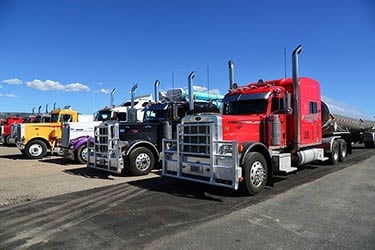 In June 2014, comedian Tracy Morgan made national headlines, not for the content of his comedy, but because his limo-van was impacted and nearly destroyed in an accident involving a tractor-trailer being driven for the big-box retail giant Walmart.
In June 2014, comedian Tracy Morgan made national headlines, not for the content of his comedy, but because his limo-van was impacted and nearly destroyed in an accident involving a tractor-trailer being driven for the big-box retail giant Walmart.
Tracy Morgan’s good friend James McNair, a well-known comedian in his own right, was killed in the crash, and Mr. Morgan himself spent time in a coma in critical condition. Kevin Roper, the driver of the semi-truck that hit Mr. Morgan’s limosine van, was confirmed to have been working for 13 consecutive hours prior to the accident, and was only a half-hour shy of the federal daily limit when it occurred. Prosecutors have alleged that he had not slept for at least twenty-four hours straight in the time prior to the crash.
One detail often left out of news articles about this tragedy is that, unfortunately, wrecks with tractor trailers are not a rare occurance. Wrecks involving tractor trailers are actually increasing nationwide, according to this report from the Insurance Institute for Highway Safety. The rates of semi-truck accidents have gone up more than 16% since 2009. Your chances of being involved in a wreck involving a tractor trailer are higher than you think. It’s important to be informed and aware of your rights in case you or a loved one is involved in one of these dangerous collisions.
The Truck Driver Isn’t Acting Alone
Many news stories detailing tractor trailer accidents and their aftermath will discuss the fatigue or mental state of the truck driver at the time of the accident itself. The federal limit for amount of hours per week a driver can work is officially 70 hours, but drivers or dispatchers sometimes ignore the limits which results in tractor trailer drivers behind the wheels of the largest vehicles on the road sleep-deprived, with little opportunity for rest, and continually pushing themselves to work just a little longer. Why such long hours? The trucking industry has continually pushed for and supported changes that prioritize truckers carrying heavier loads, working longer hours, and being subjected to less oversight or awareness of the possible health and safety repercussions of the job. Semi-truck drivers, who are responsible for carrying up to 80,000 pounds of cargo, are mostly consigned to sacrifice sleep in order to make their deadlines on time.
Unlike in most other industries, when semi-truck drivers fall prey to workplace-related safety hazards such as continual sleep-deprivation, they often take place on a road full of other drivers and families who may be injured or even killed.
Know the Law
In South Carolina, the law holds that an employer is liable for the acts or actions of his or her employees in certain circumstances. This means that in the event of an accident involving a semi-truck, both the driver and the company who employed the driver can be held legally responsible for damages. It’s an important rule to keep in mind — while the driver is often singularly blamed, there may be company policies or practices which put tractor-trailer drivers in dangerous situations.
It is sometimes possible to obtain a recovery from the company employing the driver beyond the recovery from the at-fault driver if the company has failed to follow state or federal regulations on the hiring, training, and supervision of its drivers or safe maintenance of the equipment:
- Negligent Hiring: The company failed to perform a proper and thorough background check of the driver or their qualifications to drive a large commercial vehicle.
- Negligent Training: The company failed to properly train the employee in safe operation of the trailer, failed to train them in the importance of obeying laws and regulations regarding the semi-truck, and failed to consistently train them in safe-driving practices to protect the public.
- Negligent Supervision: The company failed to monitor the driver’s performance and safety record during their employment, allowed the driver to drive in excess of legally allowed hours per week, or ignored logbook violations that recorded rest periods that did not occur.
- Negligent Retention: The company failed to discipline or fire the driver after a pattern of unsafe driving becomes clear.
- Negligent Maintenance: The company failed to properly maintain the tractor-trailer itself. This isn’t always relevant, as many truck drivers own and operate their own trucks as opposed to driving company vehicles.
- Negligent Entrustment: The company entrusted the use of its tractor-trailer to a driver who is unqualified, inadequately trained, or simply incompetent.
If you’ve been the victim of a wreck involving a tractor-trailer, it’s important to ensure that every avenue is looked into in order to ensure that any possible safety violations or incidents of negligence that may have led to the accident will be prevented from happening again.
Speak With Someone Right Away
As with most vehicular accidents, it’s important to sit down with and speak with someone who deals in these areas of law as soon as possible. An attorney with some experience in the area will be able to help you and your family ensure that your rights are protected and that you are represented by someone who has your best interests in mind.
At Bluestein Attorneys, we’re happy to sit down with you to go over your unique situation and take a look at what steps you might need to take next. Schedule your free consultation today by calling (803) 779-7599 or simply by clicking the banner below.



